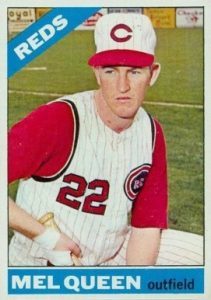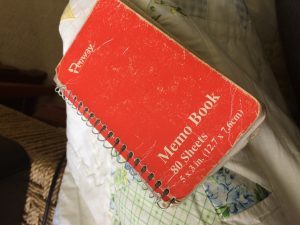Robyn Ryle's Blog, page 5
April 12, 2017
National Poetry Month: Day 12
Hayden Carruth
The first chainsaw I owned was years ago,
an old yellow McCulloch that wouldn’t start.
Bo Bremmer give it to me that was my friend,
though I’ve had enemies couldn’t of done
no worse. I took it to Ward’s over to Morrisville,
and no doubt they tinkered it as best they could,
but it still wouldn’t start. One time later
I took it down to the last bolt and gasket
and put it together again, hoping somehow
I’d do something accidental-like that would
make it go, and then I yanked on it
450 times, as I figured afterwards,
and give myself a bursitis in the elbow
that went five years even after
Doc Arrowsmith shot it full of cortisone
and near killed me when he hit a nerve
dead on. Old Stan wanted that saw, wanted it bad.
Figured I was a greenhorn that didn’t know
nothing and he could fix it. Well, I was,
you could say, being only forty at the time,
but a fair hand at tinkering. “Stan,” I said,
“you’re a neighbor. I like you. I wouldn’t
sell that thing to nobody, except maybe
Vice-President Nixon.” But Stan persisted.
He always did. One time we was loafing and
gabbing in his front dooryard, and he spied
that saw in the back of my pickup. He run
quick inside, then come out and stuck a double
sawbuck in my shirt pocket, and he grabbed
that saw and lugged it off. Next day, when I
drove past, I seen he had it snugged down tight
with a tow-chain on the bed of his old Dodge
Powerwagon, and he was yanking on it
with both hands. Two or three days after,
I asked him, “How you getting along with that
McCulloch, Stan?” “Well,” he says, “I tooken
it down to scrap, and I buried it in three
separate places yonder on the upper side
of the potato piece. You can’t be too careful,”
he says, “when you’re disposing of a hex.”
The next saw I had was a godawful ancient
Homelite that I give Dry Dryden thirty bucks for,
temperamental as a ram too, but I liked it.
It used to remind me of Dry and how he’d
clap that saw a couple times with the flat
of his double-blade axe to make it go
and how he honed the chain with a worn-down
file stuck in an old baseball. I worked
that saw for years. I put up forty-five
run them days each summer and fall to keep
my stoves het through the winter. I couldn’t now.
It’d kill me. Of course they got these here
modern Swedish saws now that can take
all the worry out of it. What’s the good
of that? Takes all the fun out too, don’t it?
Why, I reckon. I mind when Gilles Boivin snagged
an old sap spout buried in a chunk of maple
and it tore up his mouth so bad he couldn’t play
“Tea for Two” on his cornet in the town band
no more, and then when Toby Fox was holding
a beech limb that Rob Bowen was bucking up
and the saw skidded crossways and nipped off
one of Toby’s fingers. Ain’t that more like it?
Makes you know you’re living. But mostly they wan’t
dangerous, and the only thing they broke was your
back. Old Stan, he was a buller and a jammer
in his time, no two ways about that, but he
never sawed himself. Stan had the sugar
all his life, and he wan’t always too careful
about his diet and the injections. He lost
all the feeling in his legs from the knees down.
One time he started up his Powerwagon
out in the barn, and his foot slipped off the clutch,
and she jumped forwards right through the wall
and into the manure pit. He just set there,
swearing like you could of heard it in St.
Johnsbury, till his wife come out and said,
“Stan, what’s got into you?” “Missus,” he says
“ain’t nothing got into me. Can’t you see?
It’s me that’s got into this here pile of shit.”
Not much later they took away one of his
legs, and six months after that they took
the other and left him setting in his old chair
with a tank of oxygen to sip at whenever
he felt himself sinking. I remember that chair.
Stan reupholstered it with an old bearskin
that must of come down from his great-great-
grandfather and had grit in it left over
from the Civil War and a bullet-hole as big
as a yawning cat. Stan latched the pieces together
with rawhide, cross fashion, but the stitches was
always breaking and coming undone. About then
I quit stopping by to see old Stan, and I
don’t feel so good about that neither. But my mother
was having her strokes then. I figured
one person coming apart was as much
as a man can stand. Then Stan was taken away
to the nursing home, and then he died. I always
remember how he planted them pieces of spooked
McCulloch up above the potatoes. One time
I went up and dug, and I took the old
sprocket, all pitted and et away, and set it
on the windowsill right there next to the
butter mold. But I’m damned if I know why.
April 11, 2017
National Poetry Month: Day 11
 These are found poems from the back of baseball cards. Specifically, those from the 1966 season and picked at random. Well, okay, not completely at random. My team (Reds), my partner’s team (Braves), the team I like the least (Cubs–yeah, suck it, I don’t care) and the team whose park we visited last summer (Cardinals).
These are found poems from the back of baseball cards. Specifically, those from the 1966 season and picked at random. Well, okay, not completely at random. My team (Reds), my partner’s team (Braves), the team I like the least (Cubs–yeah, suck it, I don’t care) and the team whose park we visited last summer (Cardinals).
1966
Lou Brock
The Rocket came to
The Redbirds the fastest man
On the Cardinal squad
Ron Santo
Shattered records
30 homers. 114 RBIs.
All-time Cub
Game’s great ones.
Mel Queen
The young blessed
Strongest arms
Came up an outfielder
Future on the mound
Short relief stints
Felipe Alou
One of 3 Alous
Felipe champion 1956
April 10, 2017
National Poetry Month: Day 10
A good and simple Monday morning poem from Thich Nhat Hanh.
Waking up this morning, I smile.
Twenty-four brand new hours are before me.
I vow to live fully in each moment
and to look at all beings with eyes of compassion.
April 9, 2017
National Poetry Month: Day 9
 I always carry a little notebook of some sort with me. Sometimes they’re fancy. The one I have now is a Slytherin notebook a friend brought back from London. I write all kinds of things in them. Lists and phone numbers and random ideas. They make a very strange sort of diary when you go back to look at them later.
I always carry a little notebook of some sort with me. Sometimes they’re fancy. The one I have now is a Slytherin notebook a friend brought back from London. I write all kinds of things in them. Lists and phone numbers and random ideas. They make a very strange sort of diary when you go back to look at them later.
Notes Circa 2010
The library
Has a magazine called
Women and Guns
Whiskey River
Airbourne Farms
Snakes don’t die until sundown
Baptista Australis
Blue Indigo
Morning light on
Madison’s Main Street
Trees and shade
Detached deer antler
In the middle of the road
Old folks at the skate rink
Yarn needs
Bulky (for felted bowls)
Laceweight (superfine)
Lama’s Lace
Helen’s Lace (silk and wool)
Cotton/wool blend
The new mulch product
Look for book about barns
Pretty Sarah
Drive to North Vernon
Contact Neavill’s Grove
Contact Village Lights
Write letter to Aastik’s parents
Equal vinegar, sugar, water
Clove
Recycled bridge parts
Sculptures at the end of river streets
A story about a fiddle
With magic powers
April 8, 2017
National Poetry Month: Day 8
There’s a thin line between flash fiction and poetry. This is a piece I wrote in one of Kathy Fish’s amazing Fast Flash workshops. If you ever have the opportunity to take one of her classes, do it. I firmly believe her workshop could pull amazing writing out of a rock, she is that good.
We’ll All Be Together Again
Our old dog, Fluffy, is in the driveway, though he’s been dead for years. He would sit at the top of the sloping road, waiting, Mom told us, for Brownie, who disappeared the year the white van cruised the neighborhood. “It was on the news,” Mom told us. “They picked up dogs for medical experiments.” She knows that’s what happened.
Fluffy is all white, but as he sits in the driveway, his eyes glow red.
#
We order side salads and toasted ravioli. My daughter can’t get the words out fast enough. She tells me about the episode that broke her heart. “The demon ripped her here,” she says. She draws a line from her flat stomach to the place where her breasts will someday be. “She was dying and they kissed,” she said. “I waited so long.”
#
My teeth crumble in my mouth to dust.
#
After the skin’s peeled off, the butternut squash looks like cheese, orange and square. I am quiet with the knife.
#
Every new apartment is better. A window seat. Ceilings that reach the sky. We are always searching for the next best place.
#
Late afternoon, I glance up from the couch at the churchyard next door. A possum waddles in front of the steps and disappears into the overgrown weeds in our yard. The cat jumps from one window to the next, watching.
#
It’s usually my mother I’m angry at, though sometimes it’s my husband instead. What is always the same is that I have never been so filled with rage. I wake up trembling. It is as if Pandora’s box has been opened in the night and it will never be shut again.
#
We narrate our lives to each other in staccato bursts. “Meeting in Texas cancelled.” “Sam’s home sick from school.” “The deer ate all the tomatoes.” “I hate this part of my job.” “Someday we’ll all be together again.”
#
I am single again. Dating. It goes well or it doesn’t. That’s not what matters. I am back to the place where I will always be alone. It aches warm beneath my skin, just above my heart. The sadness rains down from the ceiling. But in the midst of it all, some part of me knows I’ll wake up with a warm body beside me. I know deep down that the worst is over.
#
The same day as the possum, I go out to water the garden. I find a turning tomato, sitting in the grass. The scene of the crime. Nibbled until it is almost unrecognizable. I leave it there and listen to the hiss of water from the hose. Later that night, it rains.
April 7, 2017
National Poetry Month: Day 7
I’m kind of getting into this whole found poem thing. What if poetry is everywhere and we just haven’t been paying enough attention to hear it? This poem is taken from conversations at a senior art thesis defense, where students talk about and through their work with art professors, and sometimes lucky outsiders like me. So this is art made of conversations about art. Very meta.
Art Defense
Many different ways
Resonate
Hope within itself
A possibility of excelling
Sigmund Freud
Cannot respect a woman who is sexual
In general
To visually communicate
Exploring conditions of dreams versus reality
What is fabrication
I want my audience to contemplate
The sense of space
This space that goes beyond the image
I made the frame myself
Unified in one frame
Exposure of raw wood
How each specifically touches on something
The snake being the serpent
In the second image
There’s a struggle here
Trying to protect something
There’s a very unnatural feeling here
I used cherries
Needles
A sharp and threatening object
What happens there
A sea of despair
The fairy tale aspect
It’s not very realistic
Progressivism
And moving forward
This dream that we want to attain
I see a continuity
Where light becomes important
You wanted them to be beautiful, right?
So they are a whisper?
More an investigation
Night and day
Hot and cold
These things are implied
Pretty windows that we’re looking through
April 6, 2017
National Poetry Month: Day Six
Such a beautiful sight
Green is never as green as in the strange light after an April storm and I have 2,456 steps to go so I leave the sounds of the baseball game on the TV and step out the door.
There’s a picture-perfect sunset against the stacks of the power plant at the end of 2nd St and it’s like all the images in Sunday school as a kid of God, sunlight breaking through clouds.
But then at the corner, a guy with long hair yells at me from across the street,“Where’s Telegraph Hill?” And I point toward the hill in the distance.
“No, where’s the end of Telegraph Hill?” he asks.“Where’s 3rd St.?”
“Across Main St.” And I point north and he heads toward the river which is the wrong direction and now the picture of the sunset is gone.
But then a robin lands on the sidewalk and yells at me and down at the river there’s a family, a woman in a long skirt and a girl in tight jeans and high heels with a range of boys at different heights and the woman is speaking into her cell phone in a language I don’t recognize as one of the boys points to a bucket on the river shore. “That’s someone’s bucket,” he says.
At the same spot a woman with big hair sits in her mini-van with the windows down and the radio turned up to Kenny Loggins—“Sweet love’s showin’ us a heavenly light / Never seen such a beautiful sight.”
And the petals from the cherry tree are scattered on the sidewalk and the grass is so green. Do you see? Are you looking?
And this is what life is like on a Wednesday night after a storm in a small town in Indiana.

April 5, 2017
National Poetry Month: Day Five
This morning, a blackout poem, which is a kind of found poem you make by blocking out various words in an existing document. This one came from an e-mail.
Response to Colleagues
Thank you
We *do* understand
Increasing
Responses
Questions
All under
Limited
Space
Sorry about
Exclusion. We did reduce
Attempts to go lower
Rejected
Plans to knock down walls or
Whatever else is needed
The simple fact is,
We do not even have enough
Which break out
And anything
That I’m not aware of
Thrives with
Our own and that we’re all in this together
April 4, 2017
National Poetry Month: Day 4
This poem dedicated to the folks at Hong Kong Kitchen, who are always there to feed us.
Chinese Restaurant
After an argument, my family always dined at the Chinese
restaurant. Something about the Orient washed the bitterness
away. Like a riverbank where you rest for awhile. The owner
bowed as we entered. The face of one who had seen too much.
A revolution. The torture of loved ones. Horrors he would never
reveal. His wife ushered us to our table. Her steps smaller than
ours. The younger daughter brought us tea. The older one took
our orders in perfect English. Each year her beauty was more
delicate than before. Sometimes we were the only customers
and they smiled from afar as we ate duck and shrimp with our
chopsticks. After dinner we sat in the comfort of their silence.
My brother told a joke. My mother folded a napkin into the shape
of a bird. My sister broke open our cookies and read our fortunes
aloud. As we left, my father always shook the old man’s hand.
From The Writer’s Almanac.
April 3, 2017
National Poetry Month: Day Three
In honor of Opening Day, a baseball poem by Kate Glavin from Hobart, which publishes great baseball poetry, fiction and nonfiction.
Men Try to Teach You Things
you already know.
Never take the first pitch.
Never buy a glove too big.
That’s not how I learn.
We had a knothole
gang—people
who couldn’t pay
for the game
watched us play
through holes
in the fence.
You should’ve seen
them—all tiptoes
til the last
batter swung.
That’s hard work—
always reaching
up to see.
And the funny thing is
it was always them
thanking me.



